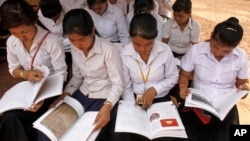Forty years after the Khmer Rouge rose to power, in a brief, brutal regime, many Cambodians still know little of their history.
But young Cambodians must understand the historical facts of the regime, and then analyze it, if they are to learn from it, says Dy Khamboly, director of the School of Genocide, Conflicts and Human Rights at Sleuk Rith Institute.
“Critical analysis, research and evaluation of this history is important,” he told “New Voices” on April 20 about the 40th anniversary of the Khmer Rouge takeover of Cambodia.
The study of Khmer Rouge history is a politically sensitive topic in Cambodia, because some government officials have roots in the regime, and until now, no in-depth courses have been allowed in Cambodian schools.
Following the regime’s ouster, in 1979, by a Vietnamese-backed Cambodian government, Khmer Rouge history was taught as propaganda. A well-researched textbook was only introduced in 2011, and even this is limited to historical facts.
Dy Khamboly said that despite its sensitivities, better understanding the history of such a traumatic period will help with reconciliation, lessons for future generations and, more importantly, a deterrent.
“Studying this very horrible part of Cambodian history is an important mechanism to prevent those horrors and pains from coming back,” he said. “Even though we currently have peace, this peace can fall into war or genocide one day if we haven’t looked back at our tragic past.”
Nhem Boraden, a lecturer at the Royal University of Phnom Penh’s international studies program, said Khmer Rouge history should be compulsory. Activities such as field trips to historical sites, in addition to classroom textbooks, are needed to make the topic more compelling to young Cambodians, who did not live through the genocide and are growing up in a fast-changing society.
An informal Facebook survey by VOA Khmer found that many younger Cambodians feel it is important to learn the history of the Khmer Rouge. But many were concerned that political influence may limit their scope of understanding it fully. Such views were echoed by “New Voices” caller from Kandal province, who identified herself as Srey Mao.
“Is studying the Khmer Rouge regime from 1975 to 1979 enough?” she asked. “I think that period of three years, 8 months, and 20 days is not difficult to understand. What’s difficult to understand, I think, is what happened before 1975, and we need to study that more.”
Dy Khamboly agreed, saying school curriculum could be broadened to include both domestic politics and global politics, including China, the US, and the Vietnam War, which all provided the context for the rise and fall of the Khmer Rouge.
Dy Khamboly said that Cambodians today do not have “extreme nationalism.” But he said he is concerned about “patterns” that can lead to racial discrimination, especially against the Vietnamese following 2013 general elections.
“There are observable small patterns that can lead to racial discrimination, to extreme nationalism, if we don’t understand and have not taken measures to prevent it,” he said. “Therefore, learning about the Khmer Rouge period can give us lessons about the danger of extreme nationalism and racial discrimination.”
One aspect of the Khmer Rouge’s extreme nationalism was its delusion about Cambodia’s ability to achieve “complete independence, self-mastery, and self-reliance” and, thus, rejecting all foreign influences, he said. He outlined these points in a recent opinion piece that calls for a critical study of genocide, to be instituted in the Cambodian education system.
The current political climate is rather favorable to this, he said, adding that he does not see many obstacles for Cambodia’s younger generation to fully understand Khmer Rouge history.
As part of the New Voices radio show's requirement for guests to suggest a good reading material, Dy Khamboly suggested a by "The Tragedy of Camboidan History: Politics, War and Revolution Since 1945" by historian David Chandler.











